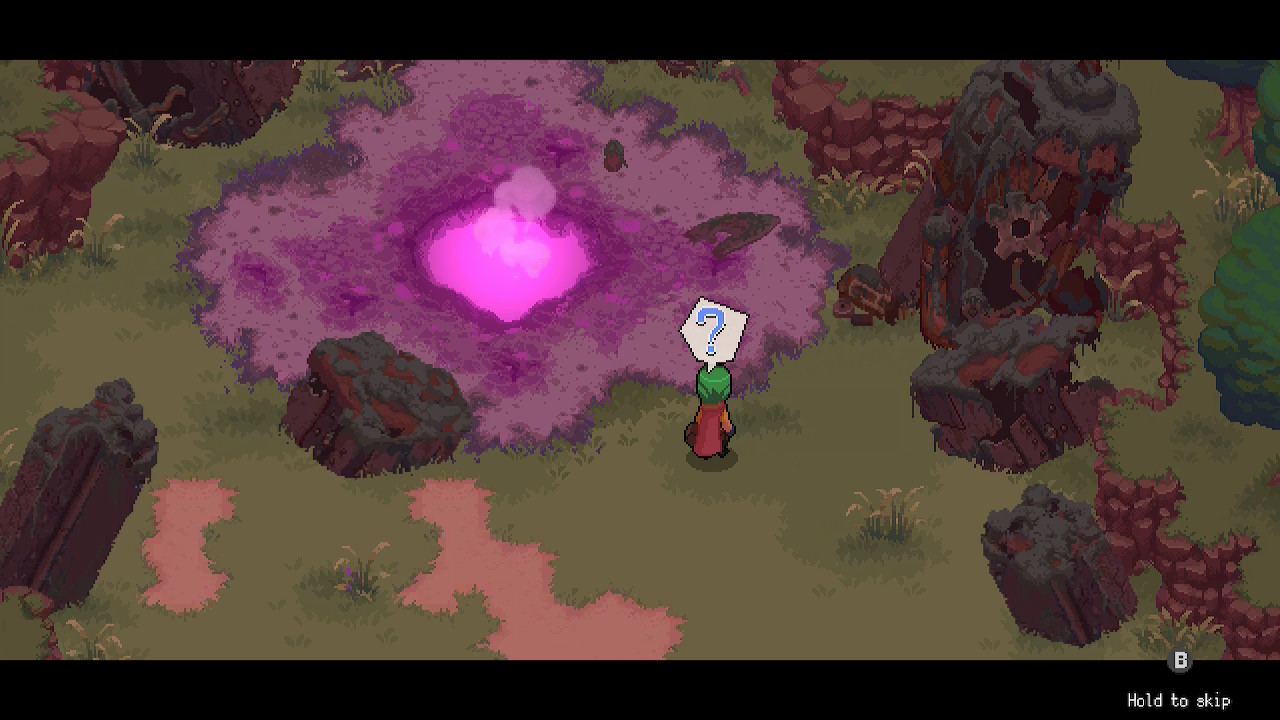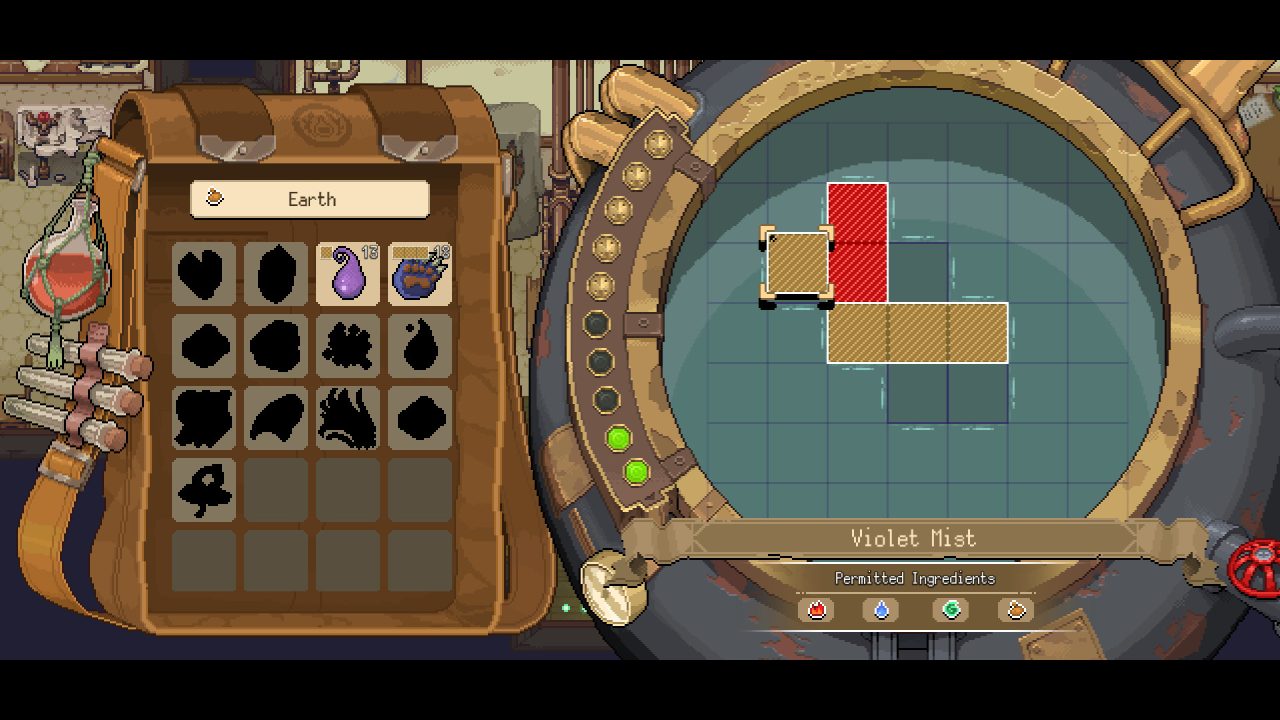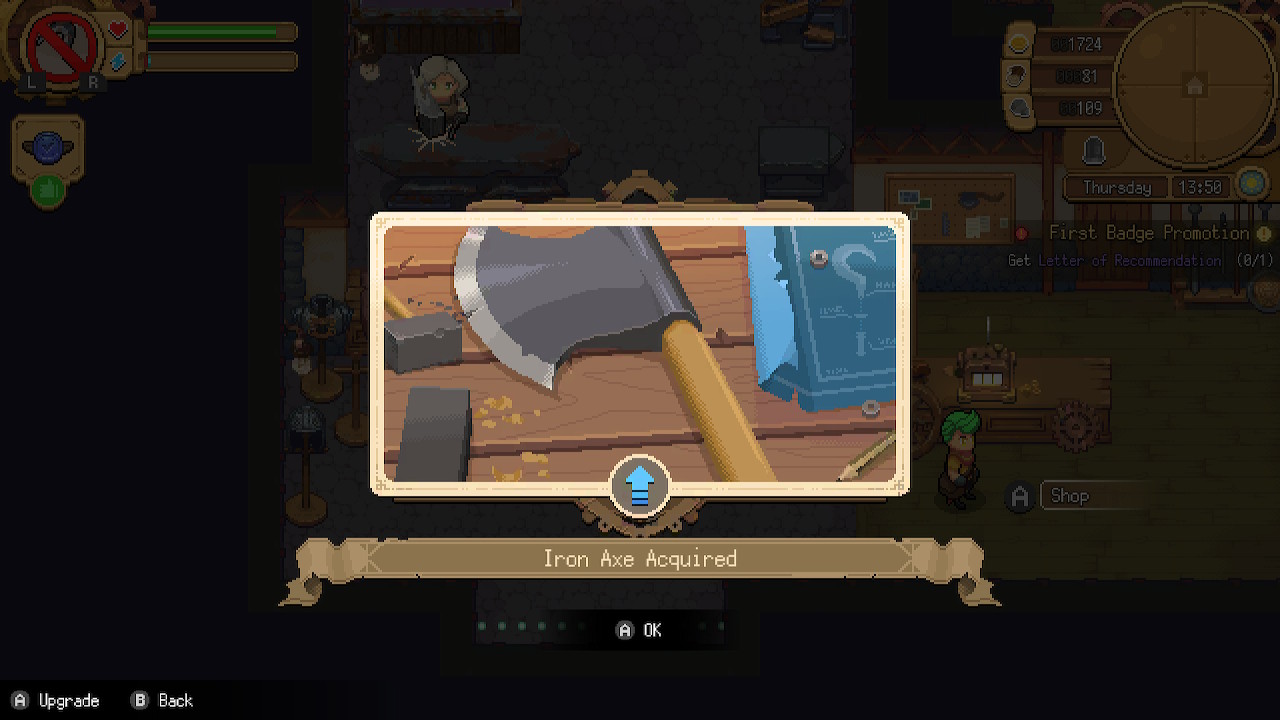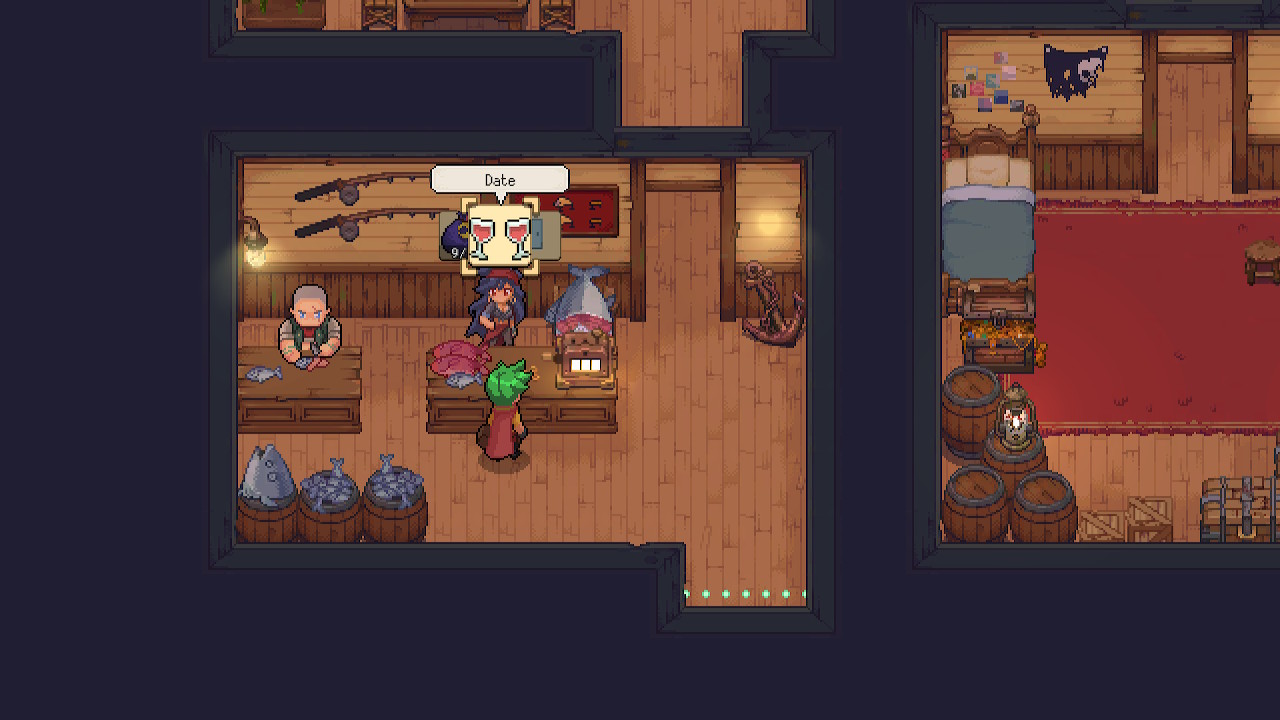The sim genre has seen more and more entries from indie and AAA developers in recent years. It’s almost like people want to experience what it’s like to actually afford a homestead and devote time to developing it. Whatever the reason, fans have their pick in terms of look, theme, and pedigree. Potion Permit seems like your everyday sim but goes its own way. While the concept is novel, the game could wear out its welcome for some.
MassHive Media has created a complex, exciting, and interwoven world. Many events unfold based on who you befriend, the time of day, what quests you’ve completed, and even how many fish you catch. They’ve done their best to make Moonbury feel alive, from the sizable bestiary and replenishing resources to the everyday routines of people in town. Unfortunately, the further I progressed, the more all these systems began to unravel. Characters traveled across the map as if boundaries meant nothing to them. Scenes became incomplete as text failed to load or characters repeated the same phrase instead of what they were meant to say.
Or worse, something wouldn’t trigger, and the scene wouldn’t progress, forcing me to reboot the game or skip the cutscene if I could. I also had a clearly completed quest come back up in my quest menu as if I didn’t finish it, which never went away. And my least favorite was my fear of teleporting around town. Because the game loaded me outside the boundaries, I traipsed over the water and behind homes, unable to get back into town for the 2 AM hit. I passed out and loaded back in my bed the following day. There are a lot of bugs to work out, some of which were remedied at launch, but there’s far to go, it seems.
Still, Potion Permit presents a generally delightful experience when running smoothly. As a chemist from the much-vaunted capital, it’s your job to heal the locals of Moonbury however you can. The problem is that almost everyone dislikes or distrusts you, the mayor and his family aside. In the past, chemists meddled and seemed to cause irreparable damage to the island’s ecosystem, and Moonbury has clearly fallen on some hard times because of that interference. As a result, you find yourself in an uphill battle to prove your worth and mend physical and emotional wounds along the way.

How you go about this is straightforward: Talking to the locals, gifting them Moon Cloves (a local tradition) to raise their friendship levels, and treating their ailments promptly and effectively. For the former, all you need to do is make a point of checking in with everyone each day, and eventually, special sequences will trigger for a given person, unlocking the next level of friendship. Thankfully, MassHive has placed billboards around town that broadcast when, where, and with whom these events will transpire. That way, you don’t need to nebulously search about town in hopes of triggering the exact circumstance you need to make the local cat your bestie. (Yeah, there’s a cat you can befriend, and it’s excellent.) You find yourself moving through each day, triggering happy surprise encounters or purposefully seeking them out, which grants the story a clear progression.
For the latter method, which is unique to Potion Permit, people will end up in your clinic and complain about an issue you’ll need to diagnose. To do so, you need to scan over their body to the problem area. Then, you’ll either reveal the potion you need to cure them or diagnose the issue. Diagnosis happens via one of three rudimentary minigames: A sort of rhythm (with no music?) game, sequence memorization, and obstacle dodging. You can also bypass the games sometimes with special serums that you craft. How well you do at these games, and the quicker you brew and provide the solution, raises your patient’s satisfaction.
If they leave satisfied, it increases the town’s trust in you, lowering prices at the shops and making people friendlier with you. This system of diagnosing and curing folks is a nice spin, but it is also indicative of another of Potion Permit‘s prominent issues — its central conceit is too easy. None of these minigames present much of a challenge until you start dealing with the most severe ailments. You don’t see those tough cases until you unlock higher permit levels and upgrade your clinic, so you can only raise the difficulty yourself, and by that point, you’re near done. The game has no real stakes because of that: it is far too easy to build and maintain trust with the town.

That extends to the other minigames at the church, post office, and police station. Each offers you a part-time job that boils down to a very basic minigame to complete in a set timeframe. After successfully assisting a few times, the employer stops by to congratulate you. At that point, I expected to get into a more difficult version of said minigame for a greater reward. Unfortunately, that is not the case, and I stopped doing it regularly because it was time-consuming (each eats two hours from your day) for little payoff. The only minigame that boasts any challenge is fishing, but even that boils down to patience, as it’s not a terribly involved process. There’s also a game for “researching” new recipes for certain quests, but it’s a matching game that requires no skill and seems more of a formality than anything. Plus, there’s whack-a-mole at the arcade if you want to play it, but it doesn’t reward you with anything (that I earned, at least.)
The most challenging minigame, so to speak, is when you brew the actual potions. Each ingredient translates to a particular shape, and you need to fit a certain number of those shapes to fill the larger pattern and successfully create your potion. The level of your cauldron determines how many components you can use. Each ingredient has an element, and some recipes only allow certain elements (fire, wind, water, and earth, respectively.) Between these two limitations, there are some decent puzzles early on to find the right combination. Inevitably they get too complex, and you’ll need to upgrade to use more ingredients as you’re treated to a new level of intricate puzzles. Thankfully, after you’ve crafted a potion five times, you can save recipes and no longer need to do the puzzle, so long as you have all the necessary components. My only real issue here is the sluggish control. What’s more, say you wanted to shuffle components: You can only “undo” back to your last placement instead of simply selecting a specific component and removing it.
To brew the titular much-needed potions in Potion Permit, you must journey into the local wilderness for ingredients. You chop trees, smash rocks, and cut foliage to stash in your satchel using your tools. However, wild beasts offer their own resources. Some are tame and happy to leave you be, but the aggressive ones will keep you on your toes. As you push further and unlock new areas, the challenge increases, revealing the only real danger the game presents. But again, if you drop from too much damage, the only penalty is waking up late the next day and maybe disappointing a patient still waiting for a cure. Combat is skill-based because you can only upgrade your health and the tools used in combat. It’s pretty easy to learn each foe’s patterns and make decent use of the dodge mechanic.

The more significant issue is that controls aren’t responsive enough for the combat style. It handles like a traditional top-down action game as you navigate about and swing wildly at enemies. However, while you can move your chemist in eight directions, they only attack in four. I took most of my damage from misaligning my attacks and had the same issue with resource gathering. And why is the latter an issue? Because of stamina drain. Every swing of any tool consumes your stamina. When it reaches zero, you can’t do anything until you munch some food or take a brief dip at the bathhouse. Also, as I mentioned, moving your cursor on the map or for teleporting or around the diagnosis screen is sluggish, making various gameplay elements more of a chore.
Speaking of chores, you have a dog! Your pup is a delightful, ever-present companion (except indoors) who you can pet. But you also need to feed it daily. At first, this is a fine way to build its friendliness with you, unlocking some new abilities that are nice to have (it can lead you to NPCs!) But once you’ve maxed that out, the daily feeding is tedious. Why you weren’t friends to begin with is beyond me, though. I dutifully took care of him, as I’m not a monster, so I don’t know if they lose trust in you should you let it slide. But it’s an element of realism players can do without.
This brings up another consideration when playing Potion Permit: It’s quite drawn out and takes time for the gameplay to get rolling as features unlock and the world opens up. Which is fine; many a game has done the same. However, once you gain more access, the local economy, clunky controls, and, frankly, the player character’s languid movement disrupt the pacing. Everything is expensive, costing a lot of gold, wood, and stone for the major upgrades. Even in the later levels, when you get larger resource drops, money is hard to come across without a lot of grinding to make potions since you’re not farming or anything. I admit that it may not be a big issue for some, as you’re not trying to rush through on a deadline.
To unlock new areas, you need to contribute your hard-earned goods to the cause, granting greater access to the world and a better relationship with the locals, furthering the story. I often hoarded resources instead of buying cosmetics or upgrades to my house and equipment because I knew I’d need them for plot development. Finally, as lovely as all the pixel work is, it feels like animations are missing a frame here and there and end up looking choppy. Framerates also take a big old dip in the larger main area. Wrap it all together and Potion Permit, unfortunately, becomes a mired experience.

While it was interesting to discover different social interactions with the modestly colorful cast of locals at first, I slowly realized that the simplistic minigames were irritating padding for the actual game, which is the story vignettes. And even then, the writing is only okay and may be suited to a younger audience (and another pass by proofreaders.) Still, it’s enjoyable to learn more about Moonbury, its history, the residents, and the troubles with chemists. There are lessons on anxiety, acceptance, overworking, and other genuine life concerns that I’m grateful exist here. But for all your socializing, the romance mechanic is underwhelming, unlocking cute dating sequences and nothing else with your chosen partner. Still, it’s at least inclusive, as you can confess your feelings to whomever, regardless of gender choice. And though I’ve seen in places pre-launch that you’re only allowed to date one person, Moonbury didn’t shun me for testing out polyamory.
In the end, I am happy with much of my time spent on Potion Permit, but I’m equally pleased to be done with it. Though there was no obvious ending, I can set it aside for now, feeling satisfaction at the good I did in Moonbury. Despite a pretty graphical veneer, a brief and lovely soundtrack, and solid sound design, it can’t compensate for the buggy, cumbersome gameplay and an average collection of stories. Still, if you’re patient and enough patches come, there’s a ton of charm and some unique ideas in Potion Permit to enjoy, and I hope MassHive refines their approach for future entries in this world.


